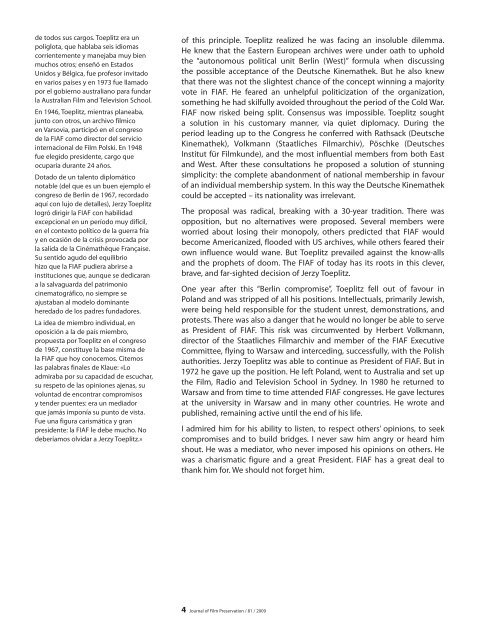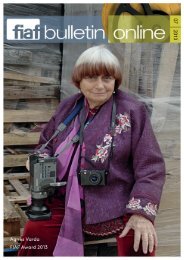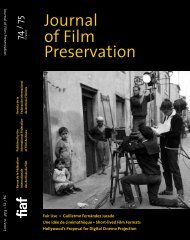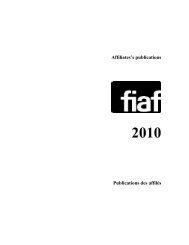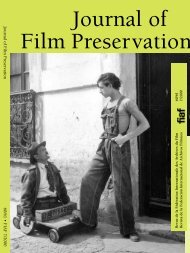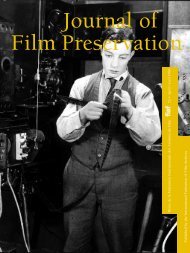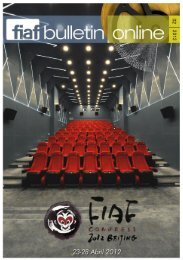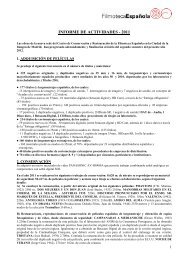Journal of Film Preservation - FIAF
Journal of Film Preservation - FIAF
Journal of Film Preservation - FIAF
Create successful ePaper yourself
Turn your PDF publications into a flip-book with our unique Google optimized e-Paper software.
de todos sus cargos. Toeplitz era un<br />
políglota, que hablaba seis idiomas<br />
corrientemente y manejaba muy bien<br />
muchos otros; enseñó en Estados<br />
Unidos y Bélgica, fue pr<strong>of</strong>esor invitado<br />
en varios países y en 1973 fue llamado<br />
por el gobierno australiano para fundar<br />
la Australian <strong>Film</strong> and Television School.<br />
En 1946, Toeplitz, mientras planeaba,<br />
junto con otros, un archivo fílmico<br />
en Varsovia, participó en el congreso<br />
de la <strong>FIAF</strong> como director del servicio<br />
internacional de <strong>Film</strong> Polski. En 1948<br />
fue elegido presidente, cargo que<br />
ocuparía durante 24 años.<br />
Dotado de un talento diplomático<br />
notable (del que es un buen ejemplo el<br />
congreso de Berlín de 1967, recordado<br />
aquí con lujo de detalles), Jerzy Toeplitz<br />
logró dirigir la <strong>FIAF</strong> con habilidad<br />
excepcional en un período muy difícil,<br />
en el contexto político de la guerra fría<br />
y en ocasión de la crisis provocada por<br />
la salida de la Cinémathèque Française.<br />
Su sentido agudo del equilibrio<br />
hizo que la <strong>FIAF</strong> pudiera abrirse a<br />
instituciones que, aunque se dedicaran<br />
a la salvaguarda del patrimonio<br />
cinematográfico, no siempre se<br />
ajustaban al modelo dominante<br />
heredado de los padres fundadores.<br />
La idea de miembro individual, en<br />
oposición a la de país miembro,<br />
propuesta por Toeplitz en el congreso<br />
de 1967, constituye la base misma de<br />
la <strong>FIAF</strong> que hoy conocemos. Citemos<br />
las palabras finales de Klaue: «Lo<br />
admiraba por su capacidad de escuchar,<br />
su respeto de las opiniones ajenas, su<br />
voluntad de encontrar compromisos<br />
y tender puentes: era un mediador<br />
que jamás imponía su punto de vista.<br />
Fue una figura carismática y gran<br />
presidente: la <strong>FIAF</strong> le debe mucho. No<br />
deberíamos olvidar a Jerzy Toeplitz.»<br />
<strong>of</strong> this principle. Toeplitz realized he was facing an insoluble dilemma.<br />
He knew that the Eastern European archives were under oath to uphold<br />
the “autonomous political unit Berlin (West)” formula when discussing<br />
the possible acceptance <strong>of</strong> the Deutsche Kinemathek. But he also knew<br />
that there was not the slightest chance <strong>of</strong> the concept winning a majority<br />
vote in <strong>FIAF</strong>. He feared an unhelpful politicization <strong>of</strong> the organization,<br />
something he had skilfully avoided throughout the period <strong>of</strong> the Cold War.<br />
<strong>FIAF</strong> now risked being split. Consensus was impossible. Toeplitz sought<br />
a solution in his customary manner, via quiet diplomacy. During the<br />
period leading up to the Congress he conferred with Rathsack (Deutsche<br />
Kinemathek), Volkmann (Staatliches <strong>Film</strong>archiv), Pöschke (Deutsches<br />
Institut für <strong>Film</strong>kunde), and the most influential members from both East<br />
and West. After these consultations he proposed a solution <strong>of</strong> stunning<br />
simplicity: the complete abandonment <strong>of</strong> national membership in favour<br />
<strong>of</strong> an individual membership system. In this way the Deutsche Kinemathek<br />
could be accepted – its nationality was irrelevant.<br />
The proposal was radical, breaking with a 30-year tradition. There was<br />
opposition, but no alternatives were proposed. Several members were<br />
worried about losing their monopoly, others predicted that <strong>FIAF</strong> would<br />
become Americanized, flooded with US archives, while others feared their<br />
own influence would wane. But Toeplitz prevailed against the know-alls<br />
and the prophets <strong>of</strong> doom. The <strong>FIAF</strong> <strong>of</strong> today has its roots in this clever,<br />
brave, and far-sighted decision <strong>of</strong> Jerzy Toeplitz.<br />
One year after this “Berlin compromise”, Toeplitz fell out <strong>of</strong> favour in<br />
Poland and was stripped <strong>of</strong> all his positions. Intellectuals, primarily Jewish,<br />
were being held responsible for the student unrest, demonstrations, and<br />
protests. There was also a danger that he would no longer be able to serve<br />
as President <strong>of</strong> <strong>FIAF</strong>. This risk was circumvented by Herbert Volkmann,<br />
director <strong>of</strong> the Staatliches <strong>Film</strong>archiv and member <strong>of</strong> the <strong>FIAF</strong> Executive<br />
Committee, flying to Warsaw and interceding, successfully, with the Polish<br />
authorities. Jerzy Toeplitz was able to continue as President <strong>of</strong> <strong>FIAF</strong>. But in<br />
1972 he gave up the position. He left Poland, went to Australia and set up<br />
the <strong>Film</strong>, Radio and Television School in Sydney. In 1980 he returned to<br />
Warsaw and from time to time attended <strong>FIAF</strong> congresses. He gave lectures<br />
at the university in Warsaw and in many other countries. He wrote and<br />
published, remaining active until the end <strong>of</strong> his life.<br />
I admired him for his ability to listen, to respect others’ opinions, to seek<br />
compromises and to build bridges. I never saw him angry or heard him<br />
shout. He was a mediator, who never imposed his opinions on others. He<br />
was a charismatic figure and a great President. <strong>FIAF</strong> has a great deal to<br />
thank him for. We should not forget him.<br />
4 <strong>Journal</strong> <strong>of</strong> <strong>Film</strong> <strong>Preservation</strong> / 81 / 2009


